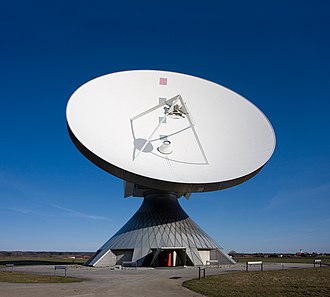Portal:Telecommunication
The Telecommunication Portal

Telecommunication, often used in its plural form or abbreviated as telecom, is the transmission of information with an immediacy comparable to face-to-face communication. As such, slow communications technologies like postal mail and pneumatic tubes are excluded from the definition. Many transmission media have been used for telecommunications throughout history, from smoke signals, beacons, semaphore telegraphs, signal flags, and optical heliographs to wires and empty space made to carry electromagnetic signals. These paths of transmission may be divided into communication channels for multiplexing, allowing for a single medium to transmit several concurrent communication sessions. Several methods of long-distance communication before the modern era used sounds like coded drumbeats, the blowing of horns, and whistles. Long-distance technologies invented during the 20th and 21st centuries generally use electric power, and include the telegraph, telephone, television, and radio.
Early telecommunication networks used metal wires as the medium for transmitting signals. These networks were used for telegraphy and telephony for many decades. In the first decade of the 20th century, a revolution in wireless communication began with breakthroughs including those made in radio communications by Guglielmo Marconi, who won the 1909 Nobel Prize in Physics. Other early pioneers in electrical and electronic telecommunications include co-inventors of the telegraph Charles Wheatstone and Samuel Morse, numerous inventors and developers of the telephone including Antonio Meucci, Philipp Reis, Elisha Gray and Alexander Graham Bell, inventors of radio Edwin Armstrong and Lee de Forest, as well as inventors of television like Vladimir K. Zworykin, John Logie Baird and Philo Farnsworth.
Since the 1960s, the proliferation of digital technologies has meant that voice communications have gradually been supplemented by data. The physical limitations of metallic media prompted the development of optical fibre. The Internet, a technology independent of any given medium, has provided global access to services for individual users and further reduced location and time limitations on communications. (Full article...)
Selected article -

A telephone, colloquially referred to as a phone, is a telecommunications device that permits two or more users to conduct a conversation when they are too far apart to be easily heard directly. A telephone converts sound, typically and most efficiently the human voice, into electronic signals that are transmitted via cables and other communication channels to another telephone which reproduces the sound to the receiving user. The term is derived from Ancient Greek: τῆλε, romanized: tēle, lit. 'far' and φωνή (phōnē, voice), together meaning distant voice.
In 1876, Alexander Graham Bell was the first to be granted a United States patent for a device that produced clearly intelligible replication of the human voice at a second device. This instrument was further developed by many others, and became rapidly indispensable in business, government, and in households. (Full article...)
General images
Things to do
 |
Here are some tasks awaiting attention:
|
Selected biography -
Antonio Santi Giuseppe Meucci (/meɪˈuːtʃi/ may-OO-chee, Italian: [anˈtɔːnjo meˈuttʃi]; 13 April 1808 – 18 October 1889) was an Italian inventor and an associate of Giuseppe Garibaldi, a major political figure in the history of Italy. Meucci is best known for developing a voice-communication apparatus that several sources credit as the first telephone.
Meucci set up a form of voice-communication link in his Staten Island, New York, home that connected the second-floor bedroom to his laboratory. He submitted a patent caveat for his telephonic device to the U.S. Patent Office in 1871, but there was no mention of electromagnetic transmission of vocal sound in his caveat. In 1876, Alexander Graham Bell was granted a patent for the electromagnetic transmission of vocal sound by undulatory electric current. Despite the longstanding general crediting of Bell with the accomplishment, the Italian Ministry of Cultural Heritage and Activities supported celebrations of Meucci's 200th birthday in 2008 using the title "Inventore del telefono" (Inventor of the telephone). The U.S. House of Representatives in a resolution in 2002 also acknowledged Meucci's work in the invention of the telephone, although the U.S. Senate did not join the resolution and the interpretation of the resolution is disputed. (Full article...)
Did you know (auto-generated) -

- ... that Buffalo's band, cheerleaders, and radio crew were unable to make the trip to the 2022 Camellia Bowl due to a winter storm?
- ... that the 1999 television film Down Will Come Baby aired two weeks after the Columbine High School massacre and was criticized for exploiting parental fears with its depiction of child violence?
- ... that former International Brigades doctor Walter Fischer managed the Austrian broadcasts of Radio Moscow during World War II?
- ... that the Voice of Freedom had to counter venomous snakes, leeches, and other wildlife?
- ... that Debra Lew Harder is the fifth person to host the Metropolitan Opera radio broadcasts since they began in 1931?
- ... that local dairy farmers credit morning broadcasts of polka music from a Wisconsin radio station for relaxing their cows?
Related portals
Topics
Subcategories
Associated Wikimedia
The following Wikimedia Foundation sister projects provide more on this subject:
-
Commons
Free media repository -
Wikibooks
Free textbooks and manuals -
Wikidata
Free knowledge base -
Wikinews
Free-content news -
Wikiquote
Collection of quotations -
Wikisource
Free-content library -
Wikiversity
Free learning tools -
Wiktionary
Dictionary and thesaurus






























































































